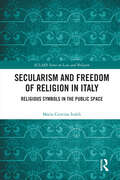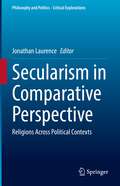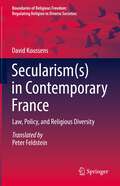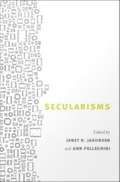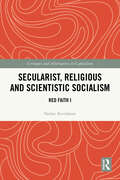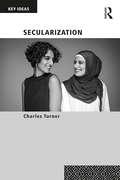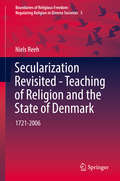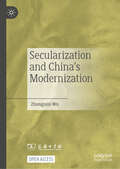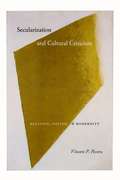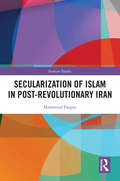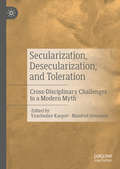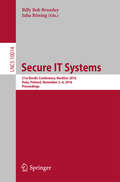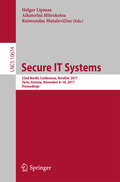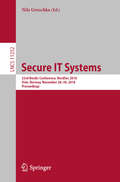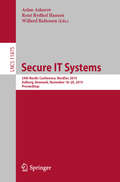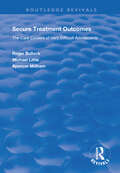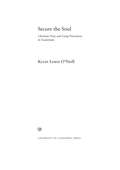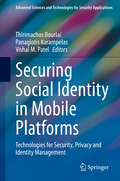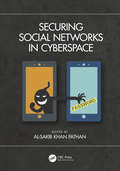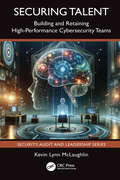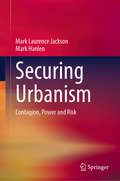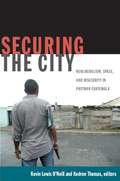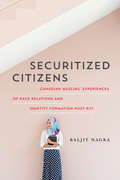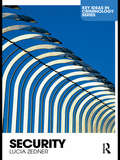- Table View
- List View
Secularism and Freedom of Religion in Italy: Religious Symbols in the Public Space (ICLARS Series on Law and Religion)
by Maria Cristina IvaldiThe display of religious symbols in the public space has been the subject of much debate. This book provides an overview of the presence of religious symbols in Italian public institutions from a legal standpoint.The situation is analysed from the perspective of the principles of laicità/secularism, as defined by the Constitutional Court, and freedom of religion. It is argued that while the display of religious symbols in public institutions has been widely investigated doctrinally, the wearing of religious symbols in Italy has generally been neglected. Key cases are examined in light of national jurisprudence as well as intervention by the European Court of Human Rights and relevant judgments from foreign courts regarding this issue. Finally, the work considers the presence of religious symbols that transcend national borders, as in the case of arts, sport and advertising. A comparison is made with the French system which takes a very different approach. The book outlines possible ways forward in light of the growing interculturality of European societies.It will be a valuable resource for academics, researchers and policy-makers working in the areas of law and religion, and comparative law.
Secularism in Comparative Perspective: Religions Across Political Contexts (Philosophy and Politics - Critical Explorations #23)
by Jonathan LaurenceThis book confronts the key questions surrounding comparative secularism in historical perspective. The contributions critically consider the normative ideas and alternative political arrangements that govern religion’s relation to politics and to the public and private spheres. Containing contributions by world-renowned scholars such as Michael Walzer, Asma Afsaruddin and Sudipta Kaviraj, this book recounts the arguments, debates, and disputations regarding secular arguments for accommodating religion. It does so in both critical and appreciative ways and describes some of the outcomes in actually existing institutions, policies, and practical arrangements. With the addition of many non-Western experiences and viewpoints on how secularism is theorized and lived, politically and historically and from Europe and Asia to Africa and the Americas, this volume is of great value political philosophers across the globe.
Secularism, Islam and Modernity
by M T Ansari Syed Alam KhundmiriSyed Alam Khundmiri (1922-83) was an important intellectual figure of his times, a true humanist with rare philosophical insights ranging over a wide field. The volume brings together Khundmiri's seminal essays which set out his dominant concerns: Marxism, with its indifference to questions of minorities in nationalism; existentialism, which he saw as being closed off to the problems of community; and Islam, which he examined in relation to history and notions of time and change. Overall, this absorbing collection of essays encapsulates Khundmiri's dual project of situating Islam in the modern context and scrutinizing the modern in the light of Islam. Particularly relevant in the present context of the increasing sacralization of politics, it will be read with great interest by students and scholars of philosophy, history, sociology, Islamic studies, Marxism, comparative religion, cultural studies, and political and social theory, as well as by the aware and concerned lay reader.
Secularism: Law, Policy, and Religious Diversity (Boundaries of Religious Freedom: Regulating Religion in Diverse Societies)
by David KoussensThe increasing visibility of Islam in France and the vehemence of debates about it have often contributed to narrow public perceptions of secularism to a simplistic antireligious crusade, a misleading image disseminated by the media and politicians alike. Taking the opposite stand, this book embarks on a comprehensive effort to document the multiple areas in which French secularism plays out - in debates over “cults,” places of worship, chaplaincy services in public institutions, the recognition of associations of worship, and more -, outlining and analizing the legal paths favored by the state in the regulation of religious diversity. While Islam has undoubtedly contributed to the reshaping of French secularism in the last decades, the book moves beyond what has come to be known as the "Muslim Question" to look at the multiplicity of challenges contemporary religious beliefs, practices, and organizations now pose to the state. David Koussens examines the main political and legal configurations of French secularism over the last thirty years through a sociological and juridical lens, in order to better document its diversity. Such a portrait emphasizes that French secularism is not a univocal phenomenon but one that appears in many guises.
Secularisms
by Ann Pellegrini Janet R. JakobsenAt a time when secularism is put forward as the answer to religious fundamentalism and violence, Secularisms offers a powerful, multivoiced critique of the narrative equating secularism with modernity, reason, freedom, peace, and progress. Bringing together essays by scholars based in religious studies, gender and sexuality studies, history, science studies, anthropology, and political science, this volume challenges the binary conception of "conservative" religion versus "progressive" secularism. With essays addressing secularism in India, Iran, Turkey, Great Britain, China, and the United States, this collection crucially complicates the dominant narrative by showing that secularism is multifaceted. How secularism is lived and experienced varies with its national, regional, and religious context. The essays explore local secularisms in relation to religious traditions ranging from Islam to Judaism, Hinduism to Christianity. Several contributors explicitly take up the way feminism has been implicated in the dominant secularization story. Ultimately, by dislodging secularism's connection to the single (and singular) progress narrative, this volume seeks to open spaces for other possible narratives about both secularism and religion--as well as for other possible ways of inhabiting the contemporary world. Contributors: Robert J. Baird, Andrew Davison, Tracy Fessenden, Janet R. Jakobsen, Laura Levitt, Molly McGarry, Afsaneh Najmabadi, Taha Parla, Geeta Patel, Ann Pellegrini, Tyler Roberts, Ranu Samantrai, Banu Subramaniam, Rajeswari Sunder Rajan, Angela Zito
Secularist, Religious and Scientific Socialism: Red Faith I (Critiques and Alternatives to Capitalism)
by Stefan ArvidssonThis book explores the various ways in which socialists have understood the relationship between their political beliefs and different religious and philosophical traditions.Considering the rise of secularism and the view that politics and life stances are two very different spheres, it moves to examine the thought of those who believed that faith and politics are as separate as night and day, those who, on the contrary, believed that socialism rests firmly on a religious foundation, and those who have argued that socialism’s foundations are solidly scientific and therefore atheist. An examination of a range of perspectives on socialism as a political ideology, a deep conviction and even a form of faith, Secularist, Religious, and Scientific Socialism explores the aesthetic, ethical, and existential ideals that have ignited the hearts of socialists, describing in detail how these ideals have been expressed in political activism, cultural forms, and ways of living.It will therefore appeal to scholars of intellectual history, political theory, political philosophy, and cultural history with interests in socialism and religion.
Secularization (Key Ideas)
by Charles Turner‘Secularization’ sounds simple, a decline in the power of religion. Yet, the history of the term is controversial and multi-faceted; it has been useful to both religious believers and non-believers and has been deployed by scholars to make sense of a variety of aspects of cultural and social change. This book will introduce the reader to this variety and show how secularization bears on the contemporary politics of religion. Secularization addresses the sociological classics’ ambivalent accounts of the future of religion, later and more robust sociological claims about religious decline, and the most influential philosophical secularization thesis, which says that the dominant ideas of modern thought are in fact religious ones in a secularized form. The book outlines some shortcomings of these accounts in the light of historical inquiry and comparative sociology; examines claims that some religions are ‘resistant to secularization’; and analyzes controversies in the politics of religion, in particular over the relationship between Christianity and Islam and over the implicitly religious character of some modern political movements. By giving equal attention to both sociological and philosophical accounts of secularization, and equal weight to ideas, institutions, and practices, this book introduces complicated ideas in a digestible format. It will appeal to students and scholars interested in making unusual connections within sociology, anthropology, philosophy, theology, and political theory.
Secularization Revisited - Teaching of Religion and the State of Denmark
by Niels ReehSince 2001, history has proven the classic and once dominant theories of secularization wrong. Instead of abandoning the subject of secularization, Niels Reeh's Secularization Revisited demonstrates how the collapse of formerly dominant secularization theories indicates fundamental conceptual challenges within sociology. Through a historical sociological case study of the political decision-making concerning the teaching of religion in Denmark from 1721 to 2006, Reeh explains why sociology of religion and sociology more generally should pay more attention to interstate relations, state-form and state-agency. The Danish state's interest in its inhabitants' religion over the last three centuries responded not only to religious motives but to concerns about foreign relations and the survival of the state.
Secularization and China's Modernization
by Zhongmin WuThis open access book examines from the perspective of secularization. Since the publication of Max Weber's Protestant Ethics and the Spirit of Capitalism, how to realize modernization in developing countries has become an urgent problem to be demonstrated. Secularization has becoming endogenous power for Chinese modernization procedure, especially since 1978. However, to understand the foundation of secularization, it is inevitable to tracing back to Chinese history. This approach contains critical analysis and profound insight to illuminate the essence of secularization in contemporary Chinese context. The author also applies the comparative approach: by comparing with Protestant ethics in many Western European countries, the significance of secularization has been emphasized. The widespread and intense secularization boosts China into the trend modernization that covers nearly all aspects of society. This book is in need for those who intended to discern the truth of Chinese modernization. It is also a key tool of reflecting modernization and development in a broader sense.
Secularization and Cultural Criticism: Religion, Nation, and Modernity (Religion and Postmodernism)
by Vincent Pecora<p>Religion is an undiscovered country for much of the secular academy, which remains deeply ambivalent about it as an object of study. On the one hand, secular scholars agree that it is time to take religion seriously. On the other, these same scholars persist in assuming that religion rests not on belief but on power and ideology. According to Vincent Pecora, the idea of the secular itself is the source of much of the contradiction and confusion in contemporary thought about religion. Pecora aims here to work through the paradoxes of secularization, which emerges in this book as an intractable problem for cultural criticism in the nation-states of the post-Enlightenment West. <p>Secularization and Cultural Criticism examines the responses of a wide range of thinkers—Edward Said, Talal Asad, Jürgen Habermas, Walter Benjamin, Emile Durkheim, Carl Schmitt, Matthew Arnold, and Virginia Woolf, among others—to illustrate exactly why the problem of secularization in the study of society and culture should matter once again. Exploring the endemic difficulty posed by religion for the modern academy, Pecora makes sense of the value and potential impasses of secular cultural criticism in a global age.</p>
Secularization of Islam in Post-Revolutionary Iran (Iranian Studies)
by Mahmoud PargooExamining the trajectory of the secularization of Islam in Iran, this book explains how efforts to Islamize society led, self-destructively, to its secularization. The research engages a range of debates across different fields, emphasizing the political and epistemological instability of the basic categories such as Islam, Sharia, and secularism. The volume is an interdisciplinary study of both the history of Islamic revival and Khomeini’s very specific merger of Islamic law and mysticism. It traces back the process of secularization to the early encounter of Iranian intellectuals with Europeans and adoption of their fundamental framework in an Islamic guise. The process continued until the Islamic Revolution of Iran in 1979, when Khomeini tried to substantively de-secularize Iranian social imaginaries. His attempts were not followed up by his followers, who vigorously reinstated the previous trend, after his death, resulting in a polity that is mostly secular but with Islamic ornaments. Bringing together area studies (Iran), religious studies (Islam), and political theory (secularism), this interdisciplinary volume places findings in a broader narrative that is both specific to Iran and broad enough to engage a global readership.
Secularization, Desecularization, and Toleration: Cross-Disciplinary Challenges to a Modern Myth
by Manfred Svensson Vyacheslav KarpovThis book challenges the modern myth that tolerance grows as societies become less religious. The myth inseparably links the progress of toleration to the secularization of modern society. This volume scrutinizes this grand narrative theoretically and empirically, and proposes alternative accounts of the varied relationships between diverse interpretations of religion and secularity and multiple secularizations, desecularizations, and forms of toleration. The authors show how both secular and religious orthodoxies inform toleration and persecution, and how secularizations and desecularizations engender repressive or pluralistic regimes. Ultimately, the book offers an agency-focused perspective which links the variation in toleration and persecution to the actors of secularization and desecularization and their cultural programs.
Secure IT Systems
by Billy Bob Brumley Juha RöningThis book constitutes the proceedings of the 21st Nordic Conference on Secure IT Systems, held in Oulu, Finland, in November 2016. The 16 full papers presented in this volume were carefully reviewed and selected from 43 submissions.The focus of the conference is on following topics: Security, System Security, Network Security, Software Security, and Information Security.
Secure IT Systems: 22nd Nordic Conference, NordSec 2017, Tartu, Estonia, November 8–10, 2017, Proceedings (Lecture Notes in Computer Science #10674)
by Helger Lipmaa, Aikaterini Mitrokotsa and Raimundas MatulevičiusThis book constitutes the proceedings of the 22nd Nordic Conference on Secure IT Systems, held in Tartu, Estonia, in November 2017.The 18 full papers presented were carefully reviewed and selected from 42 submissions. The papers address a broad range of topics in IT security and privacy. They are organized in the following topical sections: outsourcing computations; privacy preservation; security and privacy in machine learning; applications; access control; and emerging security areas.
Secure IT Systems: 23rd Nordic Conference, NordSec 2018, Oslo, Norway, November 28-30, 2018, Proceedings (Lecture Notes in Computer Science #11252)
by Nils GruschkaThis book constitutes the refereed proceedings on the 23rd Nordic Conference on Secure IT Systems, NordSec 2018, held in Oslo, Norway, in November 2018.The 29 full papers presented in this volume were carefully reviewed and selected from 81 submissions. They are organized in topical sections named: privacy; cryptography; network and cloud security; cyber security and malware; and security for software and software development.
Secure IT Systems: 24th Nordic Conference, NordSec 2019, Aalborg, Denmark, November 18–20, 2019, Proceedings (Lecture Notes in Computer Science #11875)
by René Rydhof Hansen Aslan Askarov Willard RafnssonThis book constitutes the refereed proceedings of the 24th Nordic Conference on Secure IT Systems, NordSec 2019, held in Aalborg, Denmark, in November 2019. The 17 full papers presented in this volume were carefully reviewed and selected from 32 submissions. They are organized in topical sections named: privacy; network security; platform security and malware; and system and software security.
Secure Treatment Outcomes: The Care Careers of Very Difficult Adolescents (Routledge Revivals)
by Roger Bullock Michael Little Spencer MillhamFirst published in 1998, this volume recognises that, despite the plethora of benign welfare approaches to troubled and troublesome adolescents, a small proportion find themselves locked up. Who are they, why is it thought necessary to contain them and what effect does it have? This Dartington study tries to answer these questions by scrutinising the lives of 204 young people admitted to long-stay secure treatment units. It charts their experiences from their point of entry until two years after they leave. It also looks at equally difficult youngsters whose behaviour is dealt with in other ways. With such a varied group, it is difficult to be categorical about the value of security but, by employing a 'career' perspective that takes account of the interaction between life routes and process, the relationship between young people’s background characteristics, treatment and subsequent experience becomes clear. In fact, the research found considerable predictability amid the apparent chaos, a feature that should help practitioners and managers to fashion more effective approaches.
Secure the Soul: Christian Piety and Gang Prevention in Guatemala
by Kevin Lewis O'Neill"I'm not perfect," Mateo confessed. "Nobody is. But I try. " Secure the Soul shuttles between the life of Mateo, a born-again ex-gang member in Guatemala and the gang prevention programs that work so hard to keep him alive. Along the way, this poignantly written ethnography uncovers the Christian underpinnings of Central American security. In the streets of Guatemala City--amid angry lynch mobs, overcrowded prisons, and paramilitary death squads--millions of dollars empower church missions, faith-based programs, and seemingly secular security projects to prevent gang violence through the practice of Christian piety. With Guatemala increasingly defined by both God and gangs, Secure the Soul details an emerging strategy of geopolitical significance: regional security by way of good Christian living.
Securing Social Identity in Mobile Platforms: Technologies for Security, Privacy and Identity Management (Advanced Sciences and Technologies for Security Applications)
by Vishal M. Patel Panagiotis Karampelas Thirimachos BourlaiThe book presents novel research in the areas of social identity and security when using mobile platforms. The topics cover a broad range of applications related to securing social identity as well as the latest advances in the field, including the presentation of novel research methods that are in the service of all citizens using mobile devices. More specifically, academic, industry-related and government (law enforcement, intelligence and defence) organizations, will benefit from the research topics of this book that cover the concept of identity management and security using mobile platforms from various perspectives, i.e. whether a user navigates to social media, accesses their own phone devices, access their bank accounts, uses online shopping service providers, accesses their personal documents or accounts with valuable information, surfs the internet, or even becomes a victim of cyberattacks. In all of the aforementioned cases, there is a need for mobile related technologies that protect the users’ social identity and well-being in the digital world, including the use of biometrics, cybersecurity software and tools, active authentication and identity anti-spoofing algorithms and more.
Securing Social Networks in Cyberspace
by Al-Sakib Khan PathanThis book collates the key security and privacy concerns faced by individuals and organizations who use various social networking sites. This includes activities such as connecting with friends, colleagues, and family; sharing and posting information; managing audio, video, and photos; and all other aspects of using social media sites both professionally and personally. In the setting of the Internet of Things (IoT) that can connect millions of devices at any one time, the security of such actions is paramount. Securing Social Networks in Cyberspace discusses user privacy and trust, location privacy, protecting children, managing multimedia content, cyberbullying, and much more. Current state-of-the-art defense mechanisms that can bring long-term solutions to tackling these threats are considered in the book. This book can be used as a reference for an easy understanding of complex cybersecurity issues in social networking platforms and services. It is beneficial for academicians and graduate-level researchers. General readers may find it beneficial in protecting their social-media-related profiles.
Securing Talent: Building and Retaining High-Performance Cybersecurity Teams (Security, Audit and Leadership Series)
by Kevin Lynn McLaughlinSecuring Talent: Building and Retaining High-Performance Cybersecurity Teams by Dr. Kevin Lynn McLaughlin offers a comprehensive and insightful exploration into the critical role culture plays in the cybersecurity field.Dr. McLaughlin, drawing from his extensive experience in cybersecurity leadership and risk management, addresses the acute shortage of cybersecurity professionals and underscores the importance of a supportive work environment in attracting and retaining top talent. The book begins with a personal anecdote illustrating the significant impact of organizational culture on employee engagement and leadership development. It then delves into the global scarcity of cybersecurity professionals, intensified by the increasing complexity of cyber threats and rapid technological advancements. This shortage poses a considerable risk to organizations across industries, making them vulnerable to data breaches, reputational damage, and significant economic losses. Dr. McLaughlin emphasizes the necessity of creating a positive and rewarding workplace environment to not only attract but also retain skilled professionals.The book discusses various factors contributing to the lack of qualified individuals in the field, such as inadequate investment in cybersecurity education and limited opportunities for skill development. Dr. McLaughlin argues that the high-stress nature of cybersecurity work, demanding long hours and intense focus, can deter potential talent. He advocates for investment in training programs, cultivation of the next generation of cybersecurity experts, and the creation of a workplace culture conducive to professional growth and satisfaction.
Securing Urbanism: Contagion, Power and Risk
by Mark Laurence Jackson Mark HanlenThis book is concerned with developing an in-depth understanding of contemporary political and spatial analyses of cities. In the three-part development of the book’s overall argument or premise, the reader is taken in Part I through a range of contemporary critical and political understandings of urban securitizing. This is followed by an historical urban landscape of emerging liberalism and neo-liberalism, in nineteenth-century Britain and twentieth-century United States, respectively. These case-study historical chapters enable the introduction of key political issues that are more critically assayed in Parts II and III. With Part II, the reader is introduced in depth to a series of spatial analyses undertaken by Michel Foucault that have been crucial for especially late-twentieth and twenty-first century urban theory and political geography. With Part III the full ramifications of a paradigmatic shift are explored at the level of rethinking territory, population and design. This book is timely and useful for readers who want to develop a stronger understanding of what the book’s researchers term a new political paradigm in urban planning, one ultimately governed by global economic forces that define the end of probability.
Securing the City: Neoliberalism, Space, and Insecurity in Postwar Guatemala
by Kevin Lewis O'Neil Kedron ThomasUnprecedented crime rates have made Guatemala City one of the most dangerous cities in the world. Following a peace process that ended Central America's longest and bloodiest civil war and impelled the transition from a state-centric economy to the global free market, Guatemala's neoliberal moment is now strikingly evident in the practices and politics of security. Postwar violence has not prompted public debates about the conditions that permit transnational gangs, drug cartels, and organized crime to thrive. Instead, the dominant reaction to crime has been the cultural promulgation of fear and the privatization of what would otherwise be the state's responsibility to secure the city. This collection of essays, the first comparative study of urban Guatemala, explores these neoliberal efforts at security. Contributing to the anthropology of space and urban studies, this book brings together anthropologists and historians to examine how postwar violence and responses to it are reconfiguring urban space, transforming the relationship between city and country, and exacerbating deeply rooted structures of inequality and ethnic discrimination. Contributors. Peter Benson, Manuela Camus, Avery Dickins de Girn, Edward F. Fischer, Deborah Levenson, Thomas Offit, Kevin Lewis O'Neill, Kedron Thomas, Rodrigo Jos Vliz
Securitized Citizens: Canadian Muslims’ Experiences of Race Relations and Identity Formation Post–9/11
by Baljit NagraUninformed and reactionary responses in the years following the events of 9/11 and the ongoing ‘War on Terror’ have greatly affected ideas of citizenship and national belonging. In Securitized Citizens, Baljit Nagra, develops a new critical analysis of the ideas dominant groups and institutions try to impose on young Canadian Muslims and how in turn they contest and reconceptualize these ideas. Nagra conducted fifty in-depth interviews with young Muslim adults in Vancouver and Toronto and her analysis reveals how this group experienced national belonging and exclusion in light of the Muslim ‘other’, how they reconsidered their cultural and religious identity, and what their experiences tell us about contemporary Canadian citizenship. The rich and lively interviews in Securitized Citizens successfully capture the experiences and feelings of well-educated, second-generation, and young Canadian Muslims. Nagra acutely explores how racial discourses in a post–9/11 world have affected questions of race relations, religious identity, nationalism, white privilege, and multiculturalism.
Security
by Lucia ZednerJust a decade ago security had little claim to criminological attention. Today a combination of disciplinary paradigm shifts, policy changes, and world political events have pushed security to the forefront of the criminological agenda. Distinctions between public safety and private protection, policing and security services, national and international security are being eroded. Post-9/11 the pursuit of security has been hotly debated not least because countering terrorism raises the stakes and licenses extraordinary measures. Security has become a central plank of public policy, a topical political issue, and lucrative focus of private venture but it is not without costs, problems, and paradoxes. As security governs our lives, governing security become a priority. This book provides a brief, authoritative introduction to the history of security from Hobbes to the present day and a timely guide to contemporary security politics and dilemmas. It argues that the pursuit of security poses a significant challenge for criminal justice practices and values. It defends security as public good and suggests a framework of principles by which it might better be governed. Engaging with major academic debates in criminology, law, international relations, politics, and sociology, this book stands at the vanguard of interdisciplinary writing on security.
